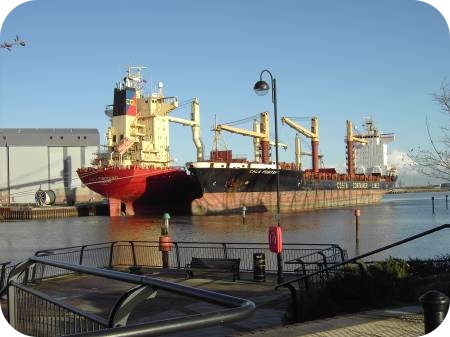The effects of the economic downturn are apparent for all to see, with companies cutting back on production, laying off staff all accompanied by the spectre of well known High Street names ceasing to trade.

However there are some places where these effects may not be so evident. For example, at the present time, there are two large container ships, the Cala Portofino and the Cala Positano, berthed on the River Tees just opposite the Riverside Stadium in Middlesbrough. The ships have been ‘mothballed’, effectively taken out of service until such time as cargoes once again become available for shipment, and it is here in this lay-by berth that they are likely to remain for several months, seemingly huddled together against the harsh realities of the current financial climate.
While the majority of the crew members on both of these ships have now been repatriated, a small number of men (seven at the time of writing) remain on board as watchmen, existing in less than ideal conditions. The Apostleship of the Sea, working with the Mission to Seafarers on South Tees, is providing whatever practical and pastoral care is needed, in order to make life on board for these men a little more bearable; this has included providing transport for various members of this ‘skeleton’ crew to attend Mass at local parishes.
Visiting a ship in a lay-by berth is unlike going to a ‘working’ ship. As soon as you get to the top of the gangway, you are conscious that the only noise you can hear is your own footfall on the metal plates as you cross the deck. There are no cranes working to load or discharge cargo and no loud voices; no noise either from the engines. The thud of feet on metal only rises in volume as you climb the metal stairs to the shipís accommodation. Here too, once inside, there is silence. The Cargo Control Room is vacant, as is the Galley; no noise of pans clattering, no smells of food cooking, just silence permeated by music or chatter from a small radio in the crew Mess Room.
The welcome from the crew men on board is nonetheless warm and we chat about how they are coping, ask if there is anything they need and generally try to lift their spirits. Fortunately for these men, they are only a few minutes walk from the town centre, but it could be said that in other ways they are a long way from civilisation. The Apostleship of the Sea and the Mission to Seafarers will continue to visit the ships regularly and provide whatever assistance the crew may need throughout their potentially long stay. Making the stranger welcome is no less important in the present situation than it is during more affluent times.
Unfortunately, the instance of ships being placed in lay-by berths, as described above, is being repeated elsewhere in the Diocese in Port of Hull, and other in ports around the country.
